Exporting Mac OSX Book Highlights into an Obsidian Vault or Markdown Files
Readwise is a great idea, but probably really useful for someone who highlights and takes notes on more platforms. It will really help consolidate them. But I mainly highlight ebooks. The whole reason I use Readwise is to get those highlights and notes into Obsidian. When I take notes on the web, I use the Obsidian Web Clipper and send highlights directly to Obsidian. I can even do this on my iPad, once I discovered the Orion Web Browser, which allowed me to install the Chrome plugin. There is also a Readwise Web Clipper iOS app that works with Safari.
Which I why I went hunting for a way to import these highlights and notes without a subscription.
Using Readwise to Import Highlights into Obsidian
Readwise will retrieve highlights and bookmarks semi-automatically from the books you buy from Kindle, by going into the Readwise app and clicking a button. If you upload them to Kindle or need highlights from the Apple Books app, you’ll have to open the book, go to your highlights, select them all, and then email them to the Readwise email address: add@readwise.com.
Then when you open your Obsidian vault where the Readwise plugin is installed, it imports all your highlights as notes. The configuration setting in the plugin are pretty simple but they do the job:
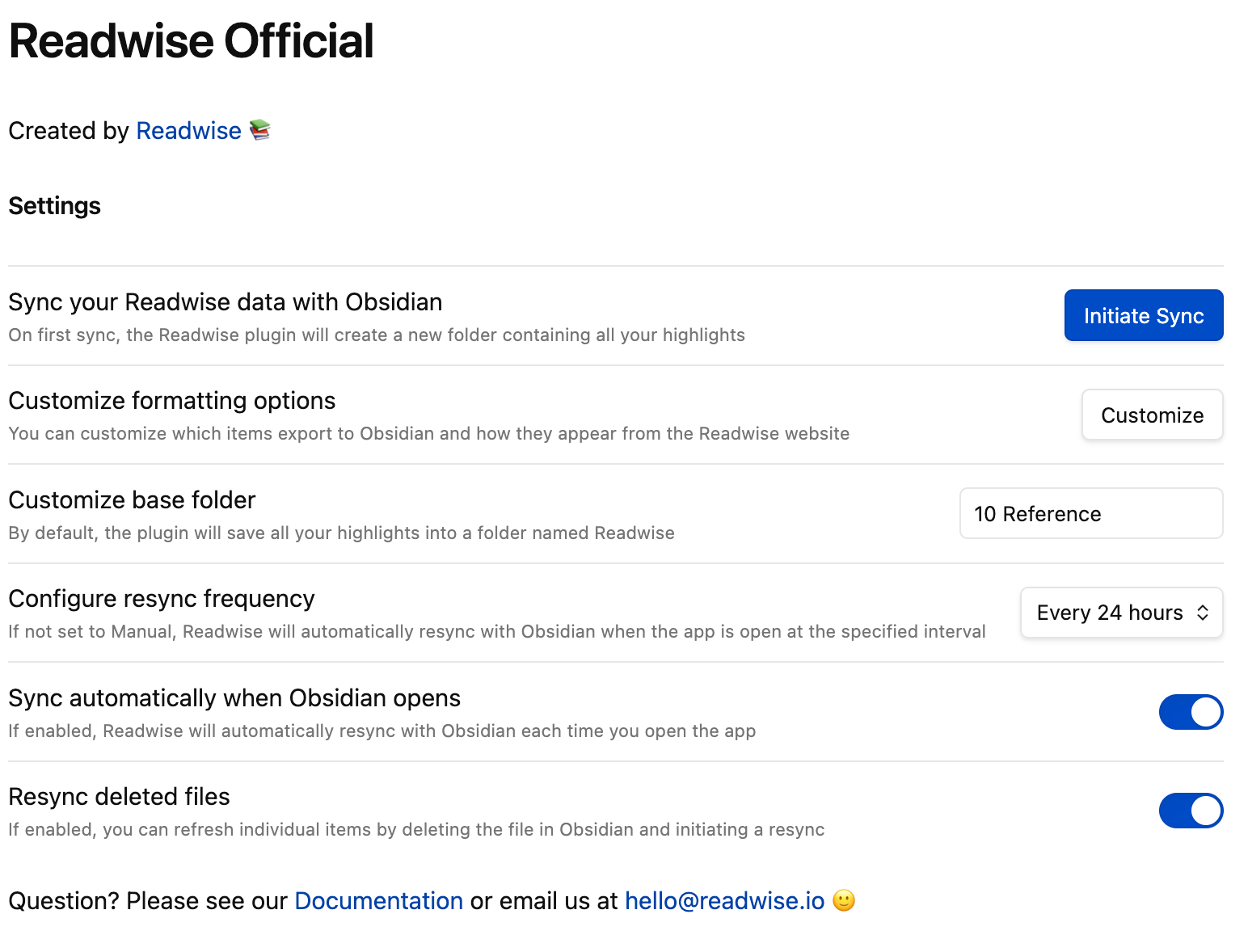
But these aren’t all the settings for the import. Part of the configuration is on the Readwise site in the export configuration page. You can get there by clicking on the Customize button.
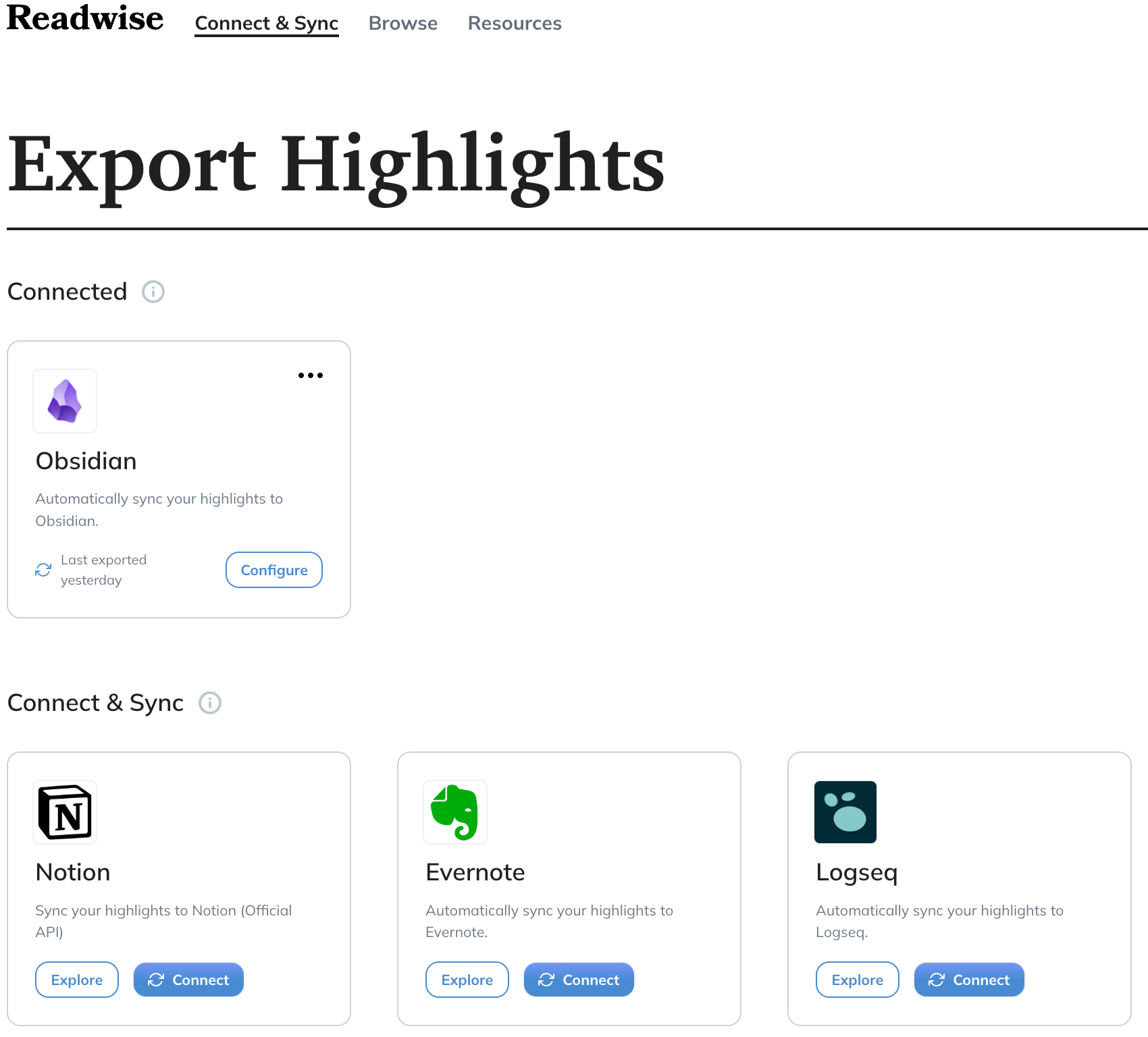
By clicking on the Obsidian integration card, you can configure a few more things:
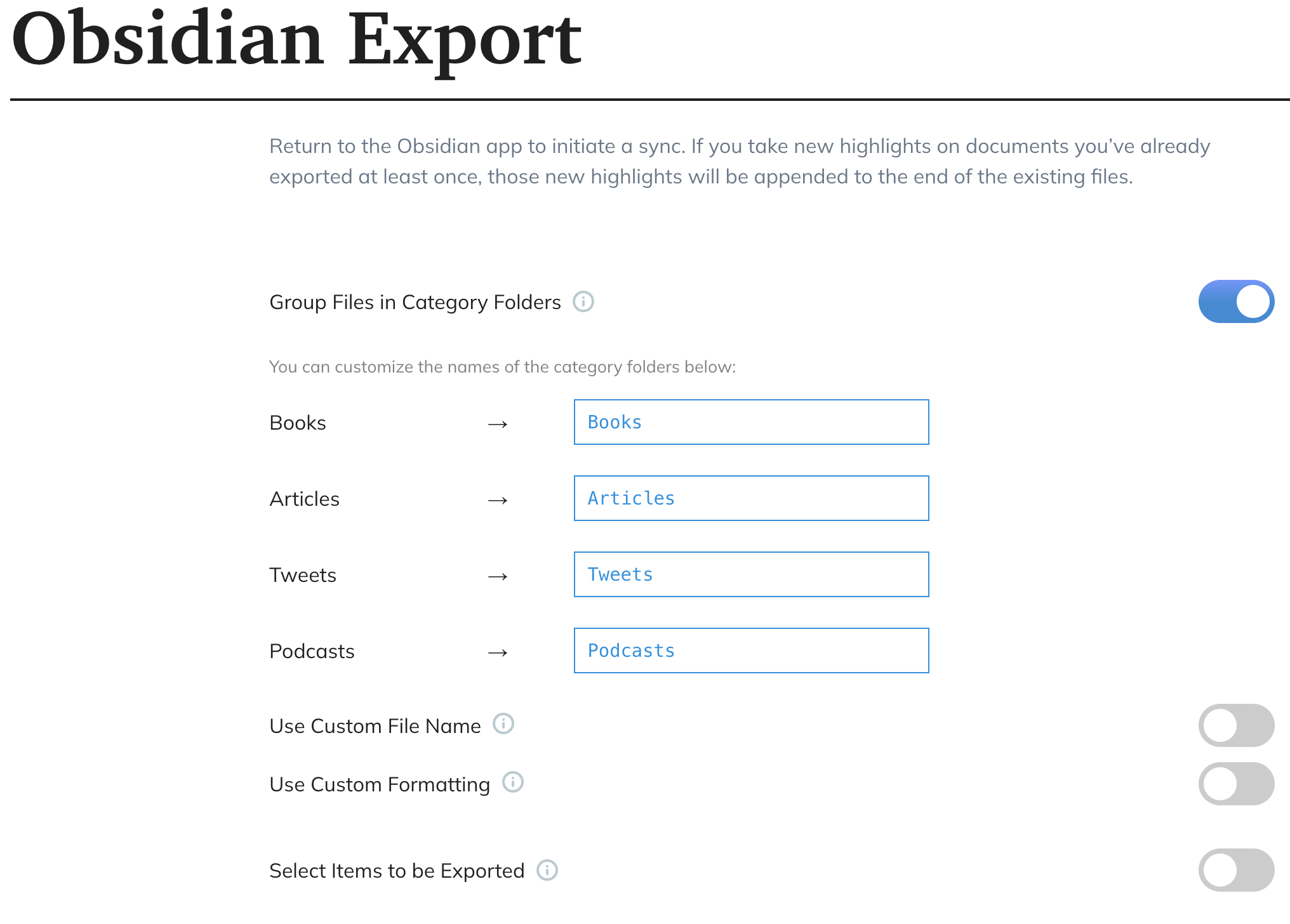
The default template for highlights creates a note that looks like this:
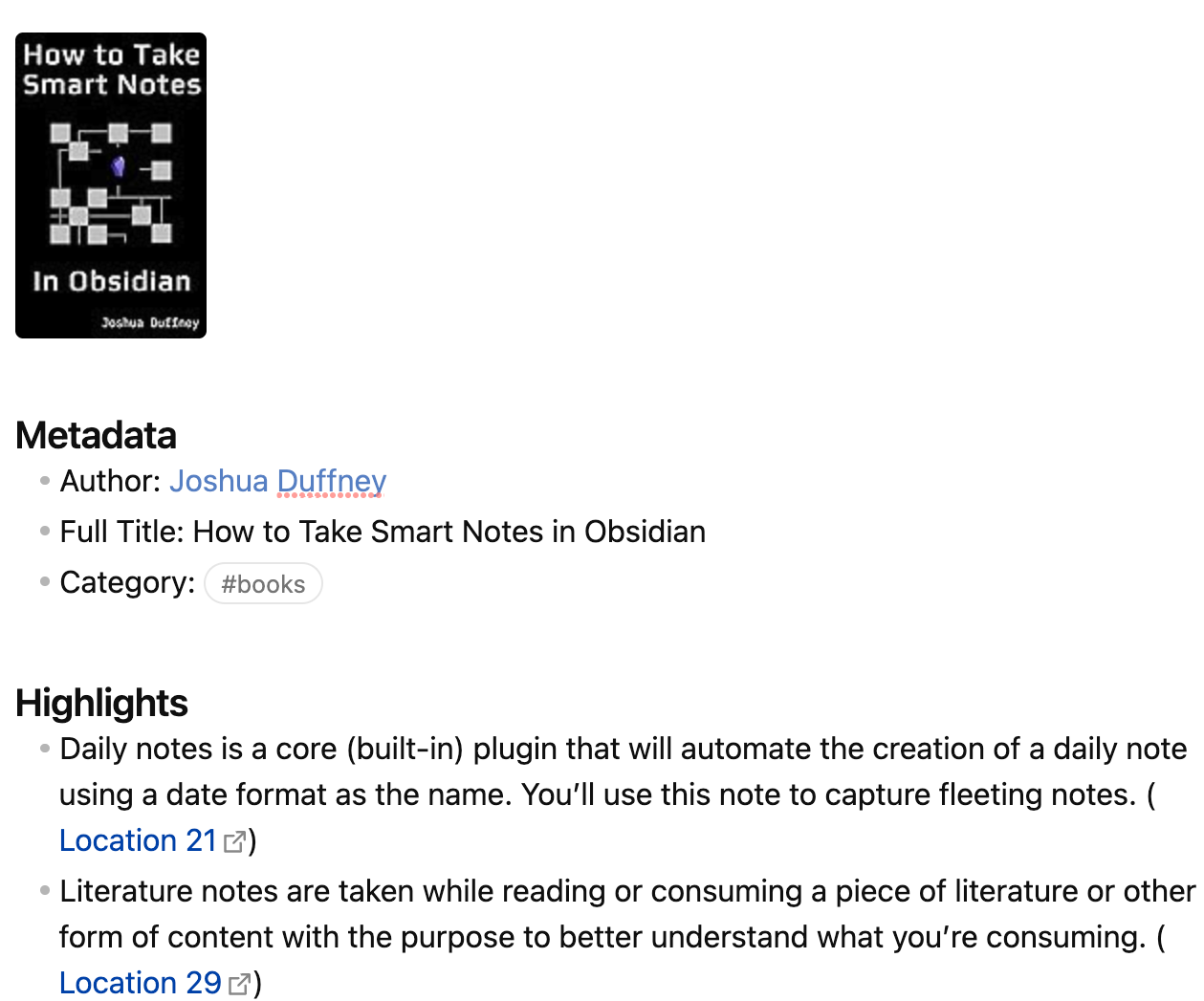
One thing I’ve planned to get to but haven’t yet is customizing the template for the export by clicking on Use Custom Formatting, because by default it doesn’t add any yaml frontmatter, which I want. It seems pretty flexible:
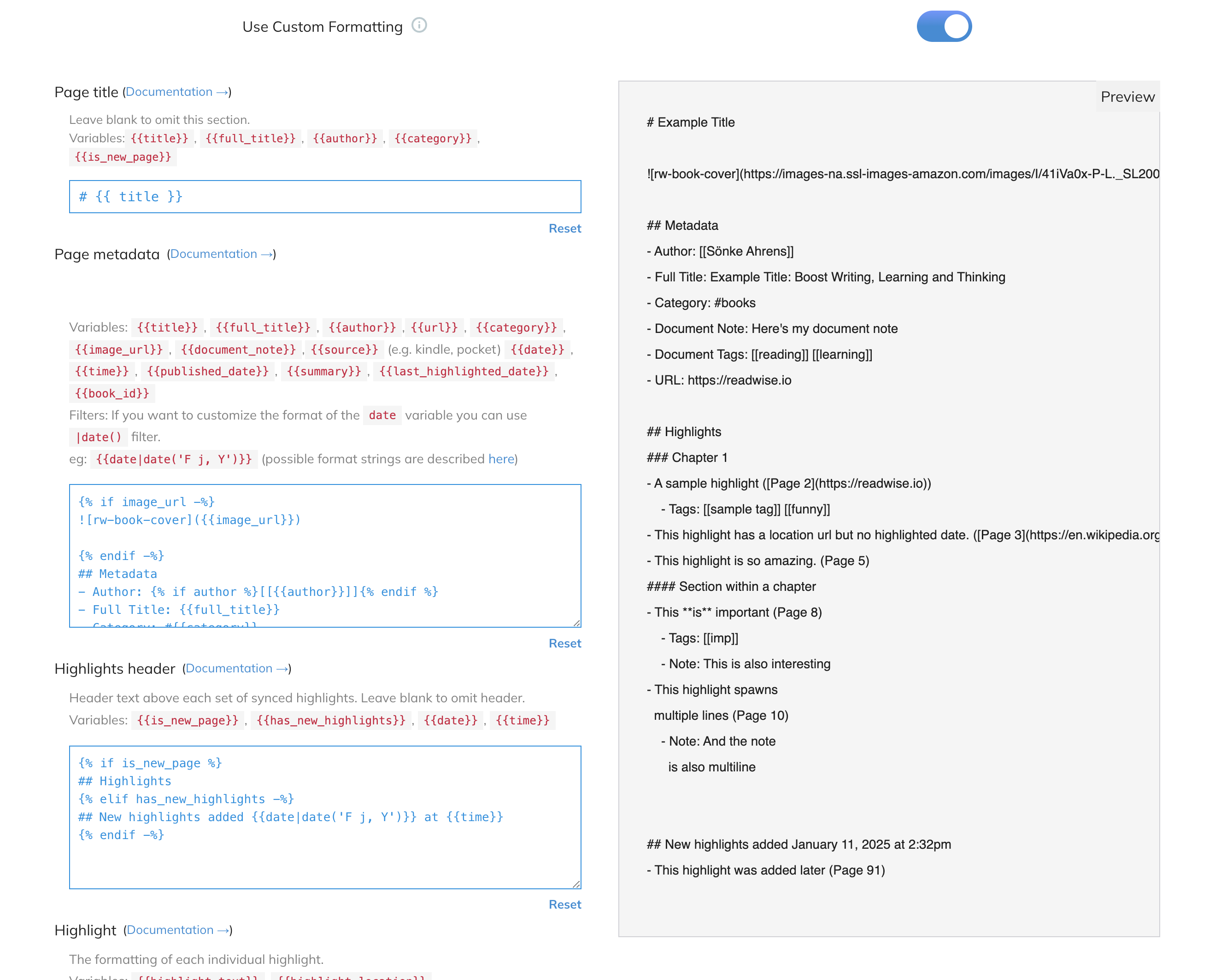
But because I thought that maybe I could recreate this email and import feature myself, I started experimenting.
Obsidian Plugin to Import Emailed Ebook Highlights
This was my first idea, since I had to do this with most of my ebooks when I used Readwise anyway and I started creating the plugin to work with Gmail. It semi-works, but it is kind of clunky and a pain in the ass and I’m not sure I will go back to work on it. One reason is that working with the Gmail API is not fun. I would have to create a service to handle that if I wanted to release it for the community. Another is that I get very limited metadata when I email the highlights and it would be nice to have more.
And then I found out that the OSX Books app stores all information on highlights and notes in an open, though hard to find, SQLite database. You can see how Calibre imports these highlights here. I import most of the ebooks I already own into the Books app and buy most of my ebooks on Kindle, where I am hoping there is an API that Readwise uses which I can figure out how to use. That’s for another blog post though. But with this script and hopefully a Kindle API, I’ll get all of my book highlights into Obsidian.
Importing Apple Books Highlights into Obsidian with Python (or Just Into a Folder)
Yes, the title says “with Python”, but you don’t need to know how to write code, just follow a few instructions. The Python script below will also work standalone to export highlights in markdown format.
Requirements
- Install the Obsidian Python Scripter plugin. You can find it by searching community plugins in Obsidian
- Optional: Install the Python ebooklib library. With this installed, it uses the path of the ebook that’s in the SQLite database to get even more metadata as well as the cover image, if it’s available.
If you are unfamiliar with installing Python libraries, open the Terminal app and type the following line to install ebooklib. It will run without ebooklib, but will provide less data:
pip install ebooklib
Python OSX Book Highlight Export Script
Then download this Python script as osx_book_notes.py from this gist:
import os
import glob
import sqlite3
import logging
import sys
from typing import List, Tuple, NamedTuple
ANNOTATION_DB_PATTERN = "~/Library/Containers/com.apple.iBooksX/Data/Documents/AEAnnotation/AEAnnotation*.sqlite"
LIBRARY_DB_PATTERN = (
"~/Library/Containers/com.apple.iBooksX/Data/Documents/BKLibrary/BKLibrary*.sqlite"
)
logging.basicConfig(
level=logging.ERROR, format="%(asctime)s - %(levelname)s - %(message)s"
)
class BookDetail(NamedTuple):
asset_id: str
title: str
author: str | None
description: str | None
epub_id: str | None
path: str | None
isbn: str | None
language: str | None
publisher: str | None
publication_date: str | None
rights: str | None
subjects: list[str] | None
cover: str | None
def sanitize_frontmatter(text: str) -> str:
if not text:
return ""
replacements = {
":": " -",
"[": "(",
"]": ")",
"{": "(",
"}": ")",
"#": "",
"|": "-",
">": "-",
"\\": "/",
"\n": " ",
"\r": " ",
}
result = str(text)
for char, replacement in replacements.items():
result = result.replace(char, replacement)
result = " ".join(result.split())
return result.strip()
def get_epub_metadata(epub_path: str):
try:
import ebooklib
from ebooklib import epub
import base64
if not epub_path:
return None
try:
book = epub.read_epub(epub_path)
metadata = {
"isbn": next(
(
val
for _, val in book.get_metadata("DC", "identifier")
if isinstance(val, str) and "isbn" in val.lower()
),
None,
),
"language": next(
(val[0] for val in book.get_metadata("DC", "language")), None
),
"publisher": next(
(val[0] for val in book.get_metadata("DC", "publisher")), None
),
"publication_date": next(
(val[0] for val in book.get_metadata("DC", "date")), None
),
"rights": next(
(val[0] for val in book.get_metadata("DC", "rights")), None
),
"subjects": [val[0] for val in book.get_metadata("DC", "subject")],
}
cover_base64 = None
for item in book.get_items():
if item.get_type() == ebooklib.ITEM_COVER:
cover_data = item.get_content()
cover_base64 = base64.b64encode(cover_data).decode("utf-8")
break
metadata["cover"] = cover_base64
return metadata
except Exception as e:
print(f"Error reading epub: {e}")
return None
except ImportError:
return None
def get_db_path(pattern: str) -> str:
paths = glob.glob(os.path.expanduser(pattern))
if not paths:
raise FileNotFoundError(f"No database found matching pattern: {pattern}")
return paths[0]
def get_book_details() -> List[BookDetail]:
try:
with sqlite3.connect(get_db_path(LIBRARY_DB_PATTERN)) as conn:
cursor = conn.cursor()
cursor.execute(
"""SELECT ZASSETID, ZSORTTITLE, ZSORTAUTHOR, ZBOOKDESCRIPTION, ZEPUBID, ZPATH
FROM ZBKLIBRARYASSET"""
)
return [
BookDetail(
asset_id=row[0],
title=row[1],
author=row[2],
description=row[3],
epub_id=row[4],
path=row[5],
isbn=None,
language=None,
publisher=None,
publication_date=None,
rights=None,
subjects=None,
cover=None,
)
for row in cursor.fetchall()
]
except sqlite3.Error as e:
logging.error(f"Database error: {e}")
raise
def get_books_with_highlights() -> List[str]:
book_ids = [book.asset_id for book in get_book_details()]
placeholders = ",".join("?" for _ in book_ids)
try:
with sqlite3.connect(get_db_path(ANNOTATION_DB_PATTERN)) as conn:
cursor = conn.cursor()
cursor.execute(
f"""SELECT DISTINCT ZANNOTATIONASSETID
FROM ZAEANNOTATION
WHERE ZANNOTATIONASSETID IN ({placeholders})
AND ZANNOTATIONSELECTEDTEXT != "";""",
book_ids,
)
return [entry[0] for entry in cursor.fetchall()]
except sqlite3.Error as e:
logging.error(f"Database error: {e}")
raise
def export_annotations(
asset_id: str, book_details: List[BookDetail], file_path: str, extra_meta: dict
) -> None:
try:
with sqlite3.connect(get_db_path(ANNOTATION_DB_PATTERN)) as conn:
cursor = conn.cursor()
cursor.execute(
"""SELECT ZANNOTATIONSELECTEDTEXT, ZANNOTATIONNOTE, ZANNOTATIONLOCATION
FROM ZAEANNOTATION
WHERE ZANNOTATIONASSETID = ? AND ZANNOTATIONSELECTEDTEXT != "";""",
(asset_id,),
)
annotations = cursor.fetchall()
except sqlite3.Error as e:
logging.error(f"Database error: {e}")
raise
create_file(book_details, annotations, file_path, extra_meta)
def create_file(
book_detail: BookDetail,
annotations: List[Tuple[str, str, str]],
file_path: str,
extra_meta: dict,
) -> None:
if extra_meta:
book_detail = book_detail._replace(**extra_meta)
try:
# Frontmatter
output_md = "---\n"
for key, value in {
field: getattr(book_detail, field) for field in BookDetail._fields
}.items():
if value and key != "cover":
output_md += f"{key}: {sanitize_frontmatter(value)}\n"
output_md += "---\n\n"
# Title
output_md += f"# {book_detail.title} by {book_detail.author}\n\n"
# Cover image
if extra_meta and extra_meta.get("cover"):
output_md += f"{% responsive_image path: data:image/jpeg;base64,{extra_meta['cover']} alt: "Cover" rest: "" %}\n\n"
# Metadata
output_md += "## Metadata\n\n"
for key, value in {
field: getattr(book_detail, field) for field in BookDetail._fields
}.items():
if key == "path":
output_md += f"- {key}: [{value}](file://{value})\n"
elif value and key != "cover":
output_md += f"- {key}: {value}\n"
# Annotations
output_md += "\n"
output_md += "## Annotations\n\n"
for highlight, note, location in annotations:
# TODO: See if something like this can be used
# epubcfi_link = f"epub://{book_detail.path}#{location}"
# output_md += f"### Location: [Open in iBooks]({epubcfi_link})\n\n"
output_md += "\n".join([f"> {line}" for line in highlight.split("\n")])
output_md += f"\n\n"
if note:
output_md += f"{note}\n\n"
output_md += f"---\n\n"
file_name = f"{book_detail.title} - {book_detail.author}.md"
with open(
(
os.path.abspath(os.path.join(file_path, file_name))
if file_path
else file_name
),
"w",
) as mdfile:
mdfile.write(output_md)
except IOError as e:
logging.error(f"Error writing to file: {e}")
raise
def main():
try:
file_path = None
if len(sys.argv) > 1:
file_path = sys.argv[1]
if len(sys.argv) > 3:
vault_path = sys.argv[1]
folder = sys.argv[3]
file_path = os.path.join(vault_path, folder)
book_details = get_book_details()
books_with_highlights = get_books_with_highlights()
except (FileNotFoundError, sqlite3.Error) as e:
logging.error(f"Error initializing: {e}")
print("An error occurred accessing the Books database.")
return
for book in books_with_highlights:
try:
book_detail = next((bd for bd in book_details if bd.asset_id == book), None)
if book_detail:
extra_meta = get_epub_metadata(book_detail.path)
export_annotations(book, book_detail, file_path, extra_meta)
print(f"Exported annotations for book: {book_detail.title}")
else:
logging.error(f"Book details not found for asset_id: {book}")
except (ValueError, sqlite3.Error, IOError) as e:
print(f"Error exporting annotations: {e}")
if __name__ == "__main__":
main()
And add it to your Obsidian vault in the following folder (YourVault/.obsidian/scripts/python/):

The .obsidian folder is hidden in the Mac OS. Type Command + Shift + . (period) to show it. If the scripts or python folders do not exist, create them.
Configuring the Obsidian Python Scripter Plugin
Enable the Python Scripter plugin. Once you do, go to its configuration page and you should see an entry for osx_book_notes.py. You can leave everything that is set the same if you want your book highlights imported into the root directly of your vault. If you want to specify a directory, click on the Add Argument button, which will add the Arg 3 entry to the form. Enter the path to the folder you want your notes stored there. And that’s all.
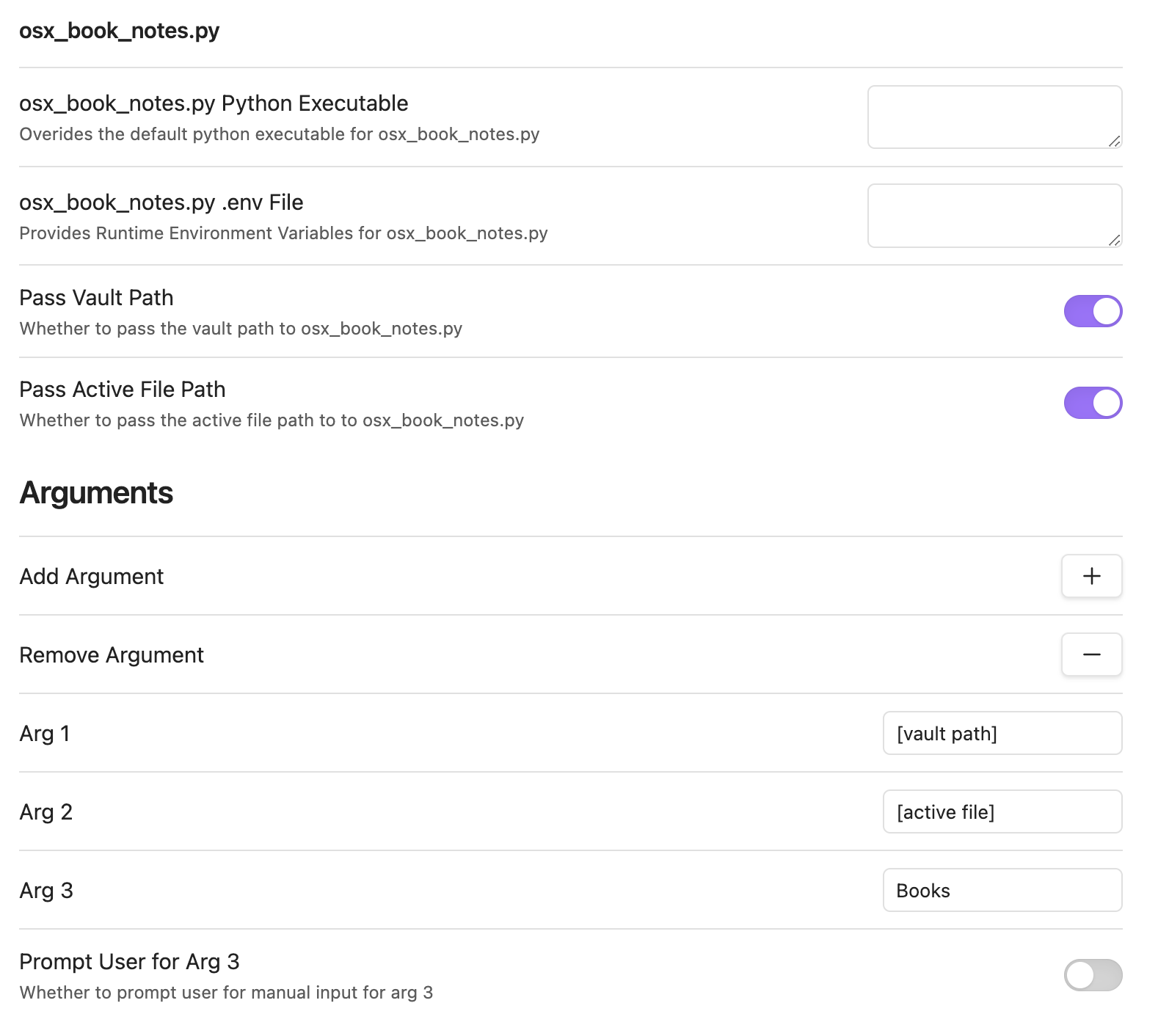
Running the Highlight Import
When you want to import highlights. Click Command + P to open the command palette, search for “python” and click on Python Scripter: Run osx_book_notes.py.
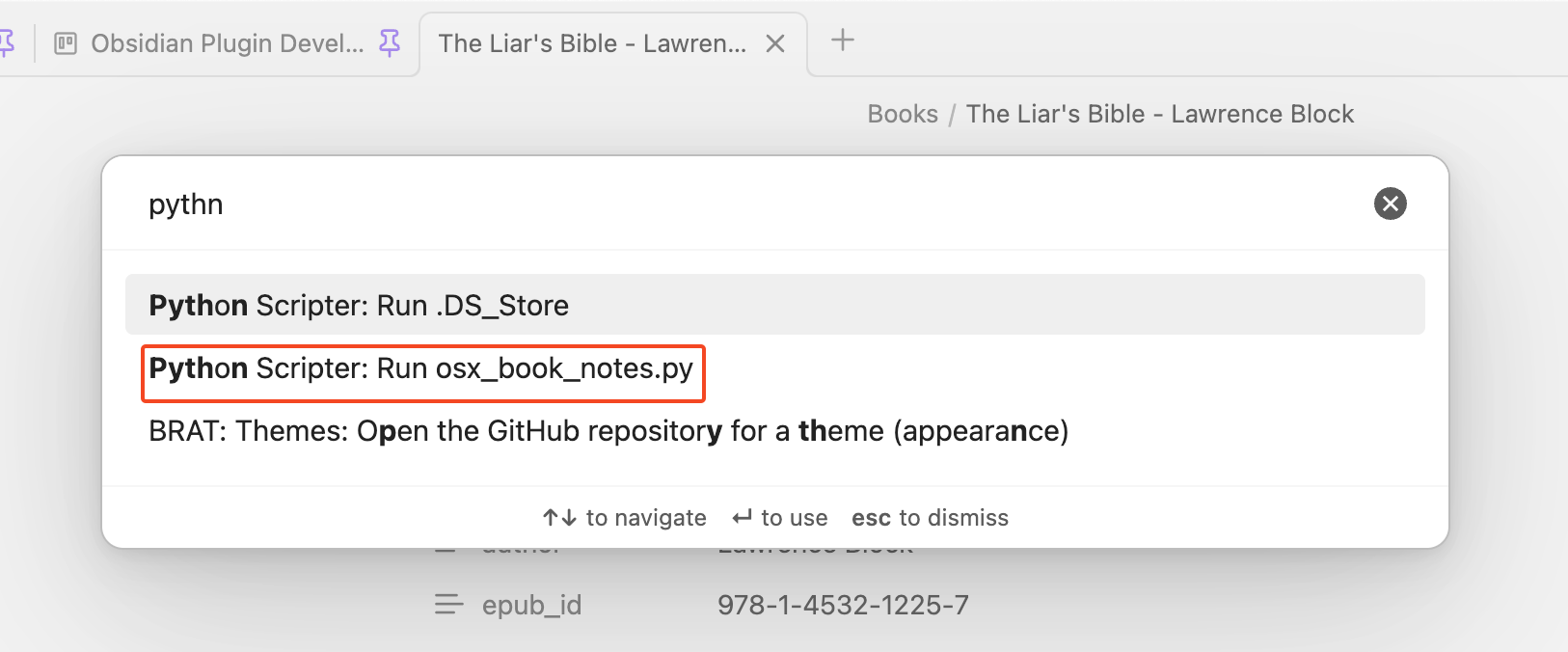
The Results
Here’s an example note:
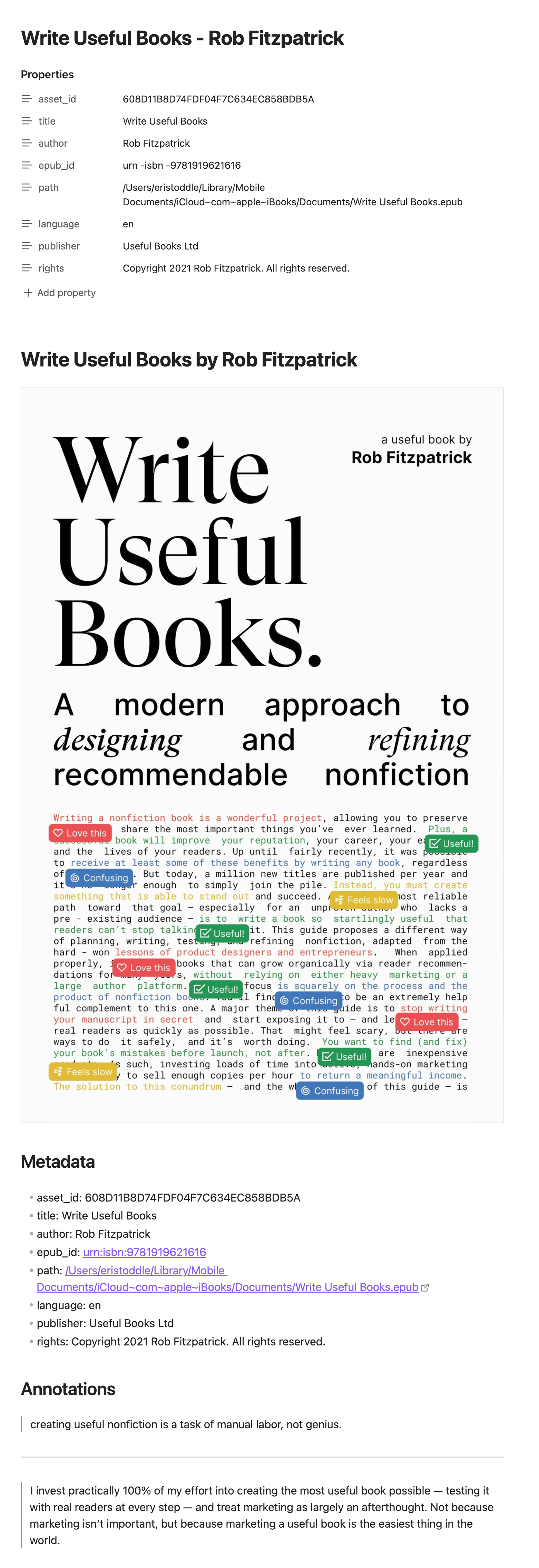
The Future: A Full-Fledged Obsidian Plugin to Import Book Highlights
I am actually just as familiar with JavaScript as I am with Python, but I am not as familiar with the Obsidian plugin API yet and I know how fiddly I can get with UI, features, and configuration. So I started with Python instead of figuring that and the ebook part out at the same time. With the Python script, I could prototype the interactions with the Books db and be sure everything would work. It actually worked better than expected, which surprised me. I pulled more data than Readwise did.
So one day I will turn this into an actual Obsidian plugin, now that I have the ebooks side of the equation figured out. Then it can have more features and options. There is not much you can do with this other than modify the Python script to do different things.
One issue with this Python implementation is that it imports all the highlights every time. This is great to keep everything in sync. Even with books you haven’t finished will be synced. The script just overwrites the old file. But the first time I ran it on my main Apple account, I realized how many accidential highlights I create. So I used my imported notes to find the books, removed the unwanted highlights in the Books app, deleted the notes, and ran the script again.
But when I create a plugin to do this, I can:
- Store a value from the SQLite database in metadata to determine when the book was last opened or highlighted and skip it (I have a dataview that sorts these by the modifed date and right now every one is modified every time in no specific order)
- Set default yaml entries for imported notes (for example, a
reviewedboolean or a#book/notestag ) - Configuration to set a template for a note so they can be customized
- Autosync on open
- Configuration option to provide a dialog to pick and choose which books to import
See what I meant about getting fiddly with features. Doing it this way first gave me an MVP in a few hours.
But really, Readwise make it relatively simple and you can try it out for two months for free to see if it works for you by signing up here.
* This website contains affiliate links. This means that if you click on a link and purchase a product or service, I may receive a small commission at no extra cost to you. Please note that I only recommend products and services that I believe in and that will add value to my readers. Not all links on this website are affiliate links. Learn more.



